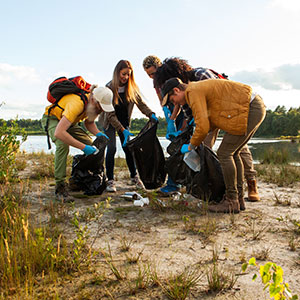How To Organize Your Community To Combat Local Environmental Threats In Louisiana
 Fighting environmental issues can feel overwhelming, especially when you’re going up against large corporations or complex government systems. But one of the most powerful tools available to residents is their own collective voice.
Fighting environmental issues can feel overwhelming, especially when you’re going up against large corporations or complex government systems. But one of the most powerful tools available to residents is their own collective voice.
In this article, we discuss how citizens can start organizing community environmental threats in Louisiana. From identifying the issues to building coalitions and engaging legal help, here’s how you can make a difference right where you live.
What’s The First Step In Organizing Your Louisiana Community To Fight Local Environmental Threats?
One of the most important early steps is to connect with established environmental groups. These organizations have experience and know-how to get momentum going. For example, the Louisiana Environmental Action Network (LEAN), a statewide organization that addresses a broad range of environmental issues, and the Louisiana Bucket Brigade, a group that focuses specifically on air pollution and industrial impacts, are both capable and experienced local groups
Depending on your issue, you may want to reach out to a general group like LEAN or a more specialized organization that aligns with your specific concern.
At the same time, it’s essential to talk to your neighbors. If something is bothering you, chances are it’s affecting them too. Community-wide concern carries much more weight than an isolated complaint. The more people you involve, the more likely your issue will be taken seriously, especially by elected officials.
How Do You Define A Neighborhood Environmental Issue To Gain Community Support In Louisiana?
Environmental issues can take many forms beyond toxic chemicals or smoke from factories. Anything that significantly affects your health or quality of life can be considered an environmental threat. Common examples include:
- Chemical pollution in air, soil, or water
- Noise pollution from nearby industry or infrastructure
- Noxious odors
- Dust or debris settling on homes and property
- Flooding caused by construction or altered drainage
- Light pollution, especially at night
- Standing water, leading to increased mosquito populations
The bottom line: if an action is unreasonably impacting your health, safety, or enjoyment of your home, it’s worth organizing around. The broader your neighbors’ agreement on the issue, the stronger your coalition becomes.

Clay Garside of Waltzer Wiygul Garside & Wild has spent years empowering Louisiana communities to organize against environmental threats.
As a seasoned environmental attorney, Clay has worked side by side with grassroots groups, helping residents navigate legal systems, challenge industrial polluters, and influence local permitting decisions. His deep experience with Louisiana’s environmental laws and coalition-based advocacy gives him unique insight into what actually works.
If your community is ready to take action, Clay can provide the legal guidance and support to make your efforts count. Contact Waltzer Wiygul Garside & Wild today to get started.
How Can Louisiana Residents Coordinate With Environmental Attorneys To Take Legal Action?
There are two main ways to connect with environmental attorneys in Louisiana:
Go Through Advocacy Organizations
Many environmental groups already work closely with attorneys and can refer you to someone experienced in your type of case.
Reach Out Directly
Our environmental attorneys offer a free initial consultation. They’ll listen to your situation and advise you on next steps.
Importantly, many environmental laws include fee-shifting provisions, meaning if you’re successful, the polluter pays your legal fees. In some cases, we may also work on contingency, only getting paid if you win. This helps reduce the financial burden on affected residents and opens the door to legal representation regardless of income level.
What Long-Term Environmental Goals Should Community Leaders Prioritize In Louisiana?
Louisiana has a long history of encouraging industrial development, particularly along the Mississippi River. While industry plays a vital role in the state’s economy, community leaders must advocate for smart, responsible development by focusing on several key things, including:
- Appropriate location: Industrial sites should not be built near neighborhoods, schools, or other sensitive areas.
- Minimized impacts: All negative effects, whether pollution, traffic, or habitat destruction, should be reduced as much as possible.
- Offsetting harms with benefits: Any unavoidable harm should be outweighed by meaningful social, environmental, or economic benefits.
Beyond responding to current threats, community members can get involved early in the permitting process. When a new facility is proposed, residents have the right to participate, raise concerns, and shape how—or if—the project moves forward.
What’s The Most Effective Way You’ve Seen A Neighborhood Organize Against A Local Environmental Threat?
The most successful grassroots efforts always begin with coming together. Organizing starts with holding local meetings, often in familiar spaces like churches or community centers, where neighbors can discuss shared concerns. Some key strategies include:
Identifying A Leader
Often, the person most passionate about the issue becomes the natural organizer.
Clarifying The Focus
Use meetings to agree on the specific issues affecting your community and set clear goals.
Attending Government Meetings
Show up at city, parish, or state hearings to raise awareness and demand action.
Staying Informed
Use tools like the EDMS database and public notices to track permit filings, pollution incidents, and government decisions.
Connecting With Nonprofits
Partner with organizations that have the experience and resources to help guide your efforts.
Engaging The Media
Public attention is a powerful tool. When the media covers your story, it increases pressure on decision-makers.
Ultimately, community unity is the strongest force in environmental advocacy. Lone voices are often ignored, but a well-organized group that shows up, speaks out, and demands accountability can create real, lasting change.
Still Have Questions? Ready To Get Started?
For more information on organizing your community against environmental threats in Louisiana, an initial consultation is your next best step. Get the information and legal answers you are seeking by calling (504) 254-4400 today.

Clay Garside of Waltzer Wiygul Garside & Wild has spent years empowering Louisiana communities to organize against environmental threats.
As a seasoned environmental attorney, Clay has worked side by side with grassroots groups, helping residents navigate legal systems, challenge industrial polluters, and influence local permitting decisions. His deep experience with Louisiana’s environmental laws and coalition-based advocacy gives him unique insight into what actually works.
If your community is ready to take action, Clay can provide the legal guidance and support to make your efforts count. Contact Waltzer Wiygul Garside & Wild today to get started.